Module 11 Body language Unit 3 Language in use课件
文档属性
| 名称 | Module 11 Body language Unit 3 Language in use课件 | 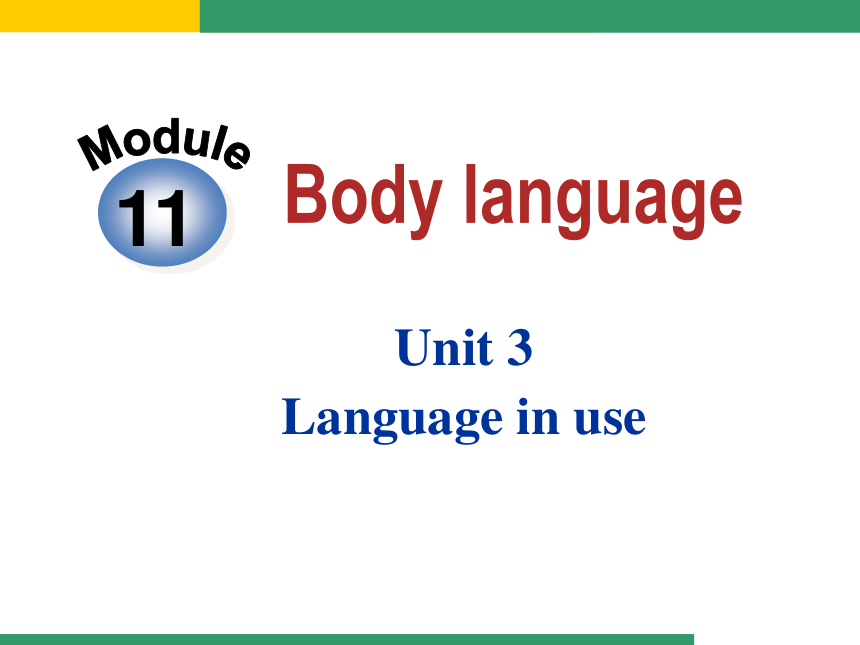 | |
| 格式 | zip | ||
| 文件大小 | 2.3MB | ||
| 资源类型 | 教案 | ||
| 版本资源 | 外研版 | ||
| 科目 | 英语 | ||
| 更新时间 | 2015-11-04 17:50:47 | ||
图片预览

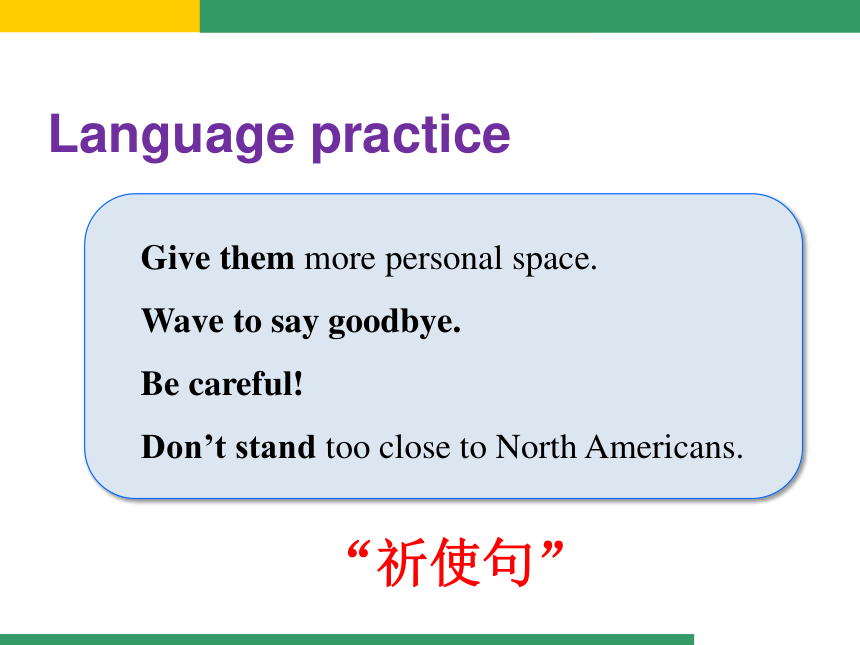


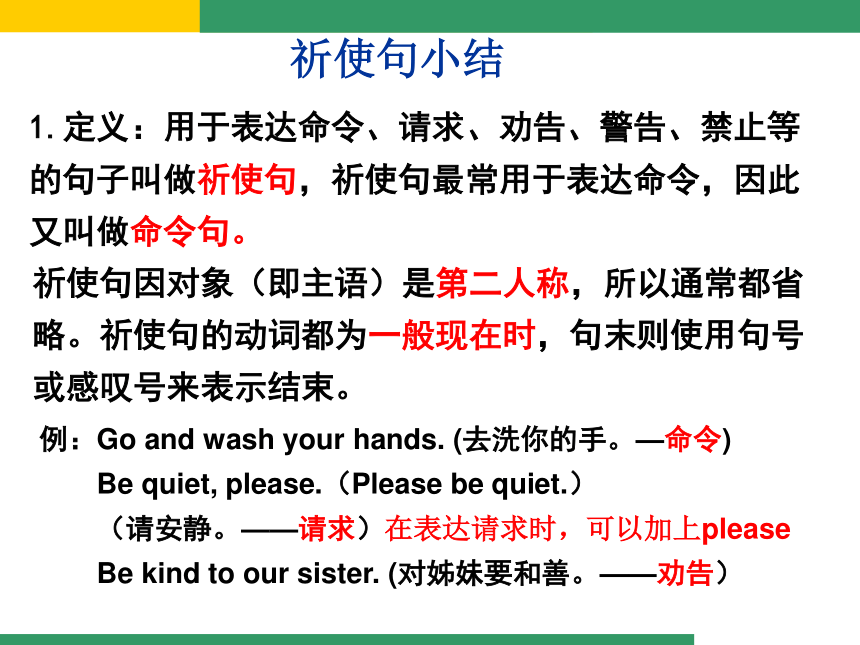
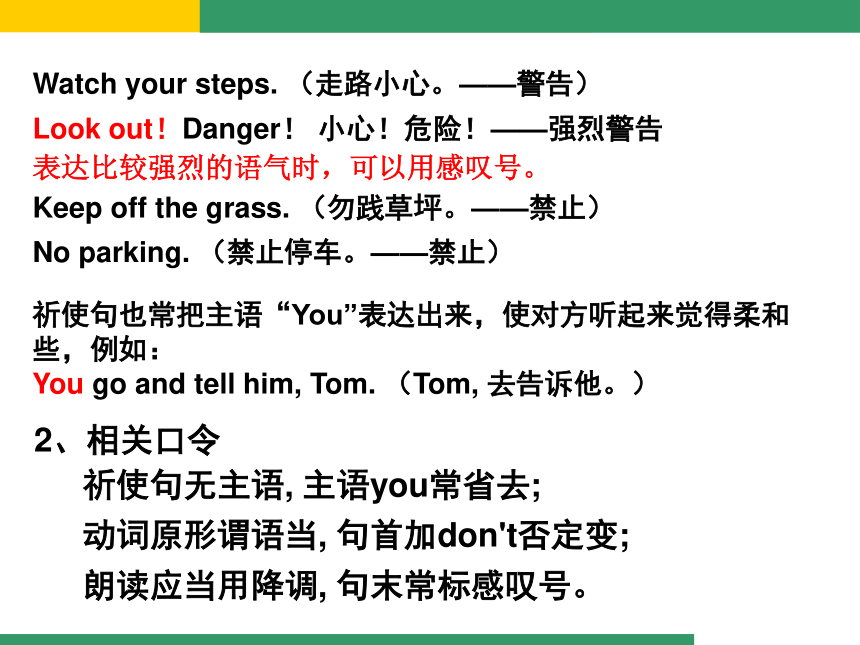
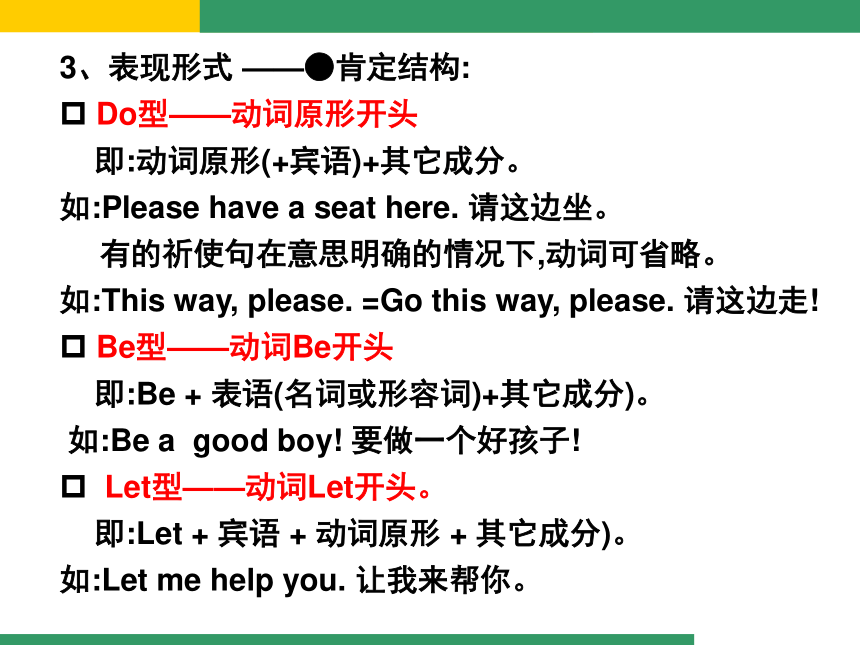

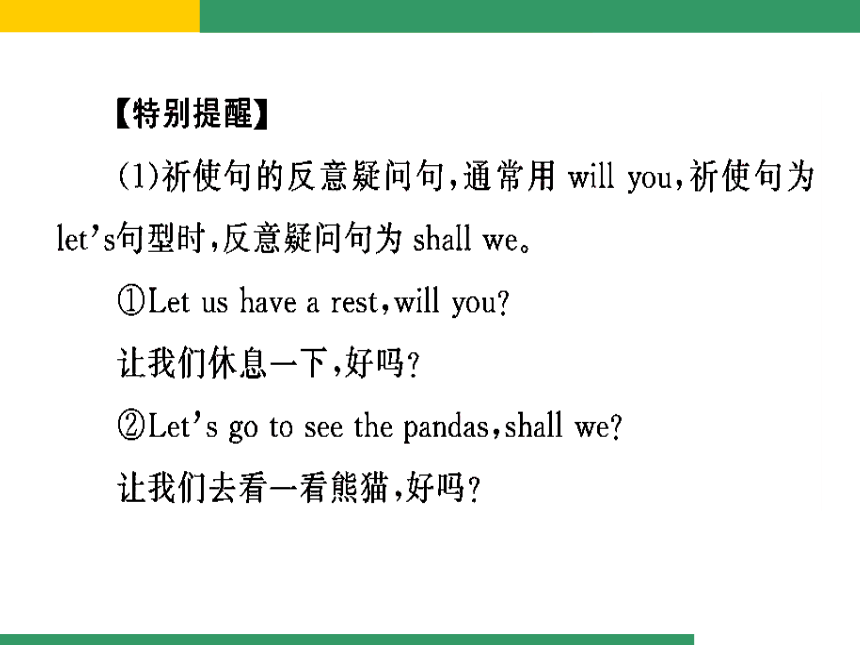
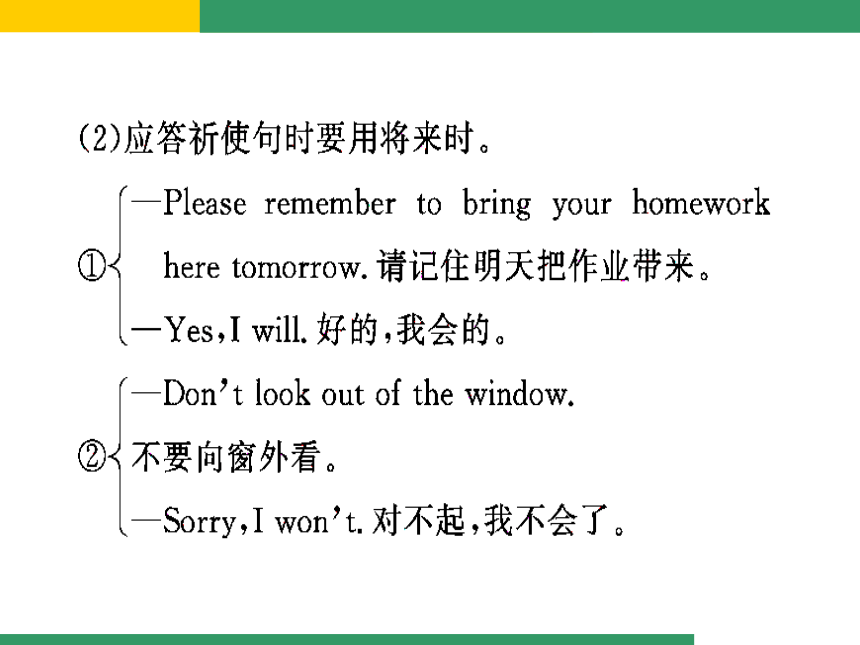
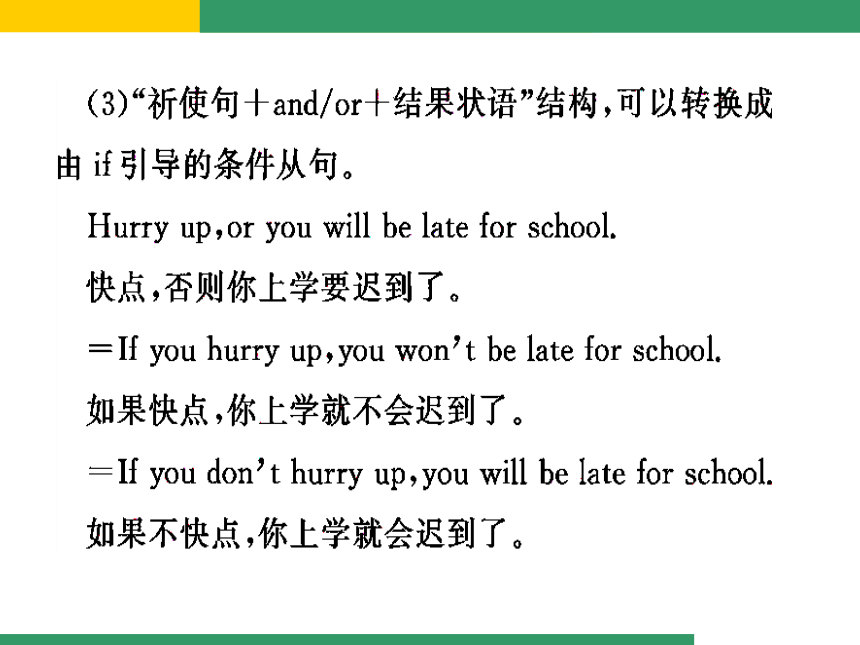

文档简介
课件35张PPT。11Body languageModuleUnit 3
Language in use
Language practiceGive them more personal space.
Wave to say goodbye.
Be careful!
Don’t stand too close to North Americans.“祈使句”
关注生活中的“祈使句”1.定义:用于表达命令、请求、劝告、警告、禁止等的句子叫做祈使句,祈使句最常用于表达命令,因此又叫做命令句。 祈使句因对象(即主语)是第二人称,所以通常都省略。祈使句的动词都为一般现在时,句末则使用句号或感叹号来表示结束。 例:Go and wash your hands. (去洗你的手。—命令)
Be quiet, please.(Please be quiet.)
(请安静。——请求)在表达请求时,可以加上please
Be kind to our sister. (对姊妹要和善。——劝告) 祈使句小结Watch your steps. (走路小心。——警告)
Look out!Danger! 小心!危险!——强烈警告
表达比较强烈的语气时,可以用感叹号。
Keep off the grass. (勿践草坪。——禁止)
No parking. (禁止停车。——禁止) 祈使句也常把主语“You”表达出来,使对方听起来觉得柔和些,例如:
You go and tell him, Tom. (Tom, 去告诉他。) 2、相关口令
祈使句无主语, 主语you常省去;
动词原形谓语当, 句首加don't否定变;
朗读应当用降调, 句末常标感叹号。 3、表现形式 ——●肯定结构:
Do型——动词原形开头
即:动词原形(+宾语)+其它成分。
如:Please have a seat here. 请这边坐。
有的祈使句在意思明确的情况下,动词可省略。
如:This way, please. =Go this way, please. 请这边走!
Be型——动词Be开头
即:Be + 表语(名词或形容词)+其它成分)。
如:Be a good boy! 要做一个好孩子!
Let型——动词Let开头。
即:Let + 宾语 + 动词原形 + 其它成分)。
如:Let me help you. 让我来帮你。 3、表现形式 ——●否定结构:
Do型和Be型的否定式都是在句首加don't构成。
如:Don't forget me! 不要忘记我!
Don't be late for school! 上学不要迟到!
Let型的否定式有两种:
①“Don‘t + let + 宾语 + 动词原形 + 其它成分”
②“Let + 宾语 + not + 动词原形 + 其它成分”。
如:Don't let him go.
Let him not go. 别让他走。
No开头——用来表示禁止性的祈使句。
如:No smoking! 禁止吸烟!
No fishing! 禁止钓鱼! 翻译下列各句。 1. 咱们一起玩吧!
2. 请不要迟到。
3. 回答这个问题。
4.不要让猫进来。
5. 上课安静。
6. 不要随处乱扔垃圾。
7. 友好待人。 Let’s play together.Don’t be late, please.Answer the question.Be quiet on class.Don’t throw litter everywhere.Be friendly to classmates. Don't let the cat come in /Let the cat not come in . 1 work in pairs. Talk about do’s and don’ts in a foreign country.2 Make a list of do's and don'ts to help
visitors to Britain.Stand in line.
Don’t touch people when you talk to them.
…Do shake hands when you meet a friend.
Do stand in line.
Do expect rain.
Please talk about the weather.
Do Say “please” and “thank you”.
Do look at people when you talk
Don’t touch people.
Don’t ask people personal question.
Don’t ask women’s age.
Don’t talk with food in your mouth.
Don’t be late.
3 Rewrite the sentences.It’s important to listen to the teacher.
Listen to the teacher.
You cannot shout in the classroom.
Don’t shout in the classroom.
1. It’s important to be careful.
2. It’s important to clean and tidy the lab.
3. You cannot touch anything if the teacher doesn’t ask you to.
4. You cannot bring food or drink into the lab.
5. You cannot enter the lab alone.1. It’s important to be careful.
2. It’s important to clean and tidy the lab.
3. You cannot touch anything if the teacher
doesn’t ask you to.
4. You cannot bring food or drink into the lab.
5. You cannot enter the lab alone.Be careful.Clean and tidy the lab.Don’t touch anything if teacher isn’t ask you to.Don’t bring food or drink into the lab.Don’t enter the lab alone.Answer the questions. Use the words
and expressions from the box to help you.all right arm in arm close different
hold on to kiss three times point at
shake hands with wave1.How do the British say hello to each other when
they first meet?
2. Does body language mean the same thing in
different countries?They shake hands with each other.No , it doesn’t.3. How do the Russians say hello to each other
when they meet?
4. Is it polite to stand close to North Americans?
5. Is it all right to wave goodbye in Greece?
6. How do you usually say goodbye with body
language?They usually kiss three times.No ,it isn’t.No ,it isn’t.I wave my hand.Around the w rldThe Japanese bow
In Japan, people bow to say “thank you”, “sorry” ,“hello”,“goodbye”, “you’re welcome”,“excuse me”, and many other things. Children and young people bow lower(更低) when they greet older(更老的) people. It’s a way of being polite and showing respect.1. ______ this kind of peach, and you will like it.
A. To try B. Trying
C. Try D. Tried
2. __________, or you’ll be late.
A. Hurry up B. Take it down
C. To hurry up D. Hurries up
3. Ssh! ________ talk loudly. The baby is sleeping
right now.
Do B. Does
C. Don’t D. Doesn’t 选择:√√√4. “_______ exercise every day, my child. It’s good for
your health,” Father said.
A. Taking B. To take
C. Take D. Takes
5. Don’t _______ too much TV. It’s bad for your eyes.
A. watch B. watched
C. watching D. to watch
6. ________ sleep too late. It’s bad for your health.
A. Do B. Not
C. Don’t D. Please not
√√√课外延伸----祈使句1.—Don’t be late again, Mike?
—_______________.
A. No, I don’t B. Don’t worry
C. Sorry, I won’t D. I don’t know
【解析】选C。2.Which sign means “No Photos”?
【解析】选C。禁止拍照。3.Tom!________ talk loudly. My little brother is sleeping.
A. Do B. Does C. Don’t D. Doesn’t
4.—Sorry for being late again. —_______here on time next time, or you’ll be punished.
A. Be B. Being C. To be D. Been
【解析】选A。【解析】选C5.Hurry up, or you will miss the train.(改为同义句)
_______you ________ hurry up, you will miss the train.
【解析】If;don’t。祈使句+or+简单句。可转换为if引导的条件状语从句的复合句。 6.看图写句子
Which school rule is the boy breaking?
答案:Don’t listen to music in class.答案:Don’t sleep in class答案:Don’t use cell-phone in class二、用括号内所给动词的恰当形式填空。
It’s an important meeting. _________ (not, be) late.
___________ (not, make) any noise! Your mother is sleeping.
__________ (not, speak) with your mouth full of food.
_________ (not, talk) and _______ (read) aloud.Don’t beDon’t makeDon’t speakDon’t talkread5. ___________ (not, leave) your
homework for tomorrow, Larry.
6. _______ (look) out! A car is coming.
7. _______ (give) us ten years and just
see what our country will be like.
8. _________ (not, let) the baby cry.Don’t leaveLook Give Don’t letWork in pairs. Talk about different
ways of saying hello and body language in China.
Write the information on your poster.
Find or draw some pictures to add to
your poster.
8 Show your poster to the whole class.Good bye!
Language in use
Language practiceGive them more personal space.
Wave to say goodbye.
Be careful!
Don’t stand too close to North Americans.“祈使句”
关注生活中的“祈使句”1.定义:用于表达命令、请求、劝告、警告、禁止等的句子叫做祈使句,祈使句最常用于表达命令,因此又叫做命令句。 祈使句因对象(即主语)是第二人称,所以通常都省略。祈使句的动词都为一般现在时,句末则使用句号或感叹号来表示结束。 例:Go and wash your hands. (去洗你的手。—命令)
Be quiet, please.(Please be quiet.)
(请安静。——请求)在表达请求时,可以加上please
Be kind to our sister. (对姊妹要和善。——劝告) 祈使句小结Watch your steps. (走路小心。——警告)
Look out!Danger! 小心!危险!——强烈警告
表达比较强烈的语气时,可以用感叹号。
Keep off the grass. (勿践草坪。——禁止)
No parking. (禁止停车。——禁止) 祈使句也常把主语“You”表达出来,使对方听起来觉得柔和些,例如:
You go and tell him, Tom. (Tom, 去告诉他。) 2、相关口令
祈使句无主语, 主语you常省去;
动词原形谓语当, 句首加don't否定变;
朗读应当用降调, 句末常标感叹号。 3、表现形式 ——●肯定结构:
Do型——动词原形开头
即:动词原形(+宾语)+其它成分。
如:Please have a seat here. 请这边坐。
有的祈使句在意思明确的情况下,动词可省略。
如:This way, please. =Go this way, please. 请这边走!
Be型——动词Be开头
即:Be + 表语(名词或形容词)+其它成分)。
如:Be a good boy! 要做一个好孩子!
Let型——动词Let开头。
即:Let + 宾语 + 动词原形 + 其它成分)。
如:Let me help you. 让我来帮你。 3、表现形式 ——●否定结构:
Do型和Be型的否定式都是在句首加don't构成。
如:Don't forget me! 不要忘记我!
Don't be late for school! 上学不要迟到!
Let型的否定式有两种:
①“Don‘t + let + 宾语 + 动词原形 + 其它成分”
②“Let + 宾语 + not + 动词原形 + 其它成分”。
如:Don't let him go.
Let him not go. 别让他走。
No开头——用来表示禁止性的祈使句。
如:No smoking! 禁止吸烟!
No fishing! 禁止钓鱼! 翻译下列各句。 1. 咱们一起玩吧!
2. 请不要迟到。
3. 回答这个问题。
4.不要让猫进来。
5. 上课安静。
6. 不要随处乱扔垃圾。
7. 友好待人。 Let’s play together.Don’t be late, please.Answer the question.Be quiet on class.Don’t throw litter everywhere.Be friendly to classmates. Don't let the cat come in /Let the cat not come in . 1 work in pairs. Talk about do’s and don’ts in a foreign country.2 Make a list of do's and don'ts to help
visitors to Britain.Stand in line.
Don’t touch people when you talk to them.
…Do shake hands when you meet a friend.
Do stand in line.
Do expect rain.
Please talk about the weather.
Do Say “please” and “thank you”.
Do look at people when you talk
Don’t touch people.
Don’t ask people personal question.
Don’t ask women’s age.
Don’t talk with food in your mouth.
Don’t be late.
3 Rewrite the sentences.It’s important to listen to the teacher.
Listen to the teacher.
You cannot shout in the classroom.
Don’t shout in the classroom.
1. It’s important to be careful.
2. It’s important to clean and tidy the lab.
3. You cannot touch anything if the teacher doesn’t ask you to.
4. You cannot bring food or drink into the lab.
5. You cannot enter the lab alone.1. It’s important to be careful.
2. It’s important to clean and tidy the lab.
3. You cannot touch anything if the teacher
doesn’t ask you to.
4. You cannot bring food or drink into the lab.
5. You cannot enter the lab alone.Be careful.Clean and tidy the lab.Don’t touch anything if teacher isn’t ask you to.Don’t bring food or drink into the lab.Don’t enter the lab alone.Answer the questions. Use the words
and expressions from the box to help you.all right arm in arm close different
hold on to kiss three times point at
shake hands with wave1.How do the British say hello to each other when
they first meet?
2. Does body language mean the same thing in
different countries?They shake hands with each other.No , it doesn’t.3. How do the Russians say hello to each other
when they meet?
4. Is it polite to stand close to North Americans?
5. Is it all right to wave goodbye in Greece?
6. How do you usually say goodbye with body
language?They usually kiss three times.No ,it isn’t.No ,it isn’t.I wave my hand.Around the w rldThe Japanese bow
In Japan, people bow to say “thank you”, “sorry” ,“hello”,“goodbye”, “you’re welcome”,“excuse me”, and many other things. Children and young people bow lower(更低) when they greet older(更老的) people. It’s a way of being polite and showing respect.1. ______ this kind of peach, and you will like it.
A. To try B. Trying
C. Try D. Tried
2. __________, or you’ll be late.
A. Hurry up B. Take it down
C. To hurry up D. Hurries up
3. Ssh! ________ talk loudly. The baby is sleeping
right now.
Do B. Does
C. Don’t D. Doesn’t 选择:√√√4. “_______ exercise every day, my child. It’s good for
your health,” Father said.
A. Taking B. To take
C. Take D. Takes
5. Don’t _______ too much TV. It’s bad for your eyes.
A. watch B. watched
C. watching D. to watch
6. ________ sleep too late. It’s bad for your health.
A. Do B. Not
C. Don’t D. Please not
√√√课外延伸----祈使句1.—Don’t be late again, Mike?
—_______________.
A. No, I don’t B. Don’t worry
C. Sorry, I won’t D. I don’t know
【解析】选C。2.Which sign means “No Photos”?
【解析】选C。禁止拍照。3.Tom!________ talk loudly. My little brother is sleeping.
A. Do B. Does C. Don’t D. Doesn’t
4.—Sorry for being late again. —_______here on time next time, or you’ll be punished.
A. Be B. Being C. To be D. Been
【解析】选A。【解析】选C5.Hurry up, or you will miss the train.(改为同义句)
_______you ________ hurry up, you will miss the train.
【解析】If;don’t。祈使句+or+简单句。可转换为if引导的条件状语从句的复合句。 6.看图写句子
Which school rule is the boy breaking?
答案:Don’t listen to music in class.答案:Don’t sleep in class答案:Don’t use cell-phone in class二、用括号内所给动词的恰当形式填空。
It’s an important meeting. _________ (not, be) late.
___________ (not, make) any noise! Your mother is sleeping.
__________ (not, speak) with your mouth full of food.
_________ (not, talk) and _______ (read) aloud.Don’t beDon’t makeDon’t speakDon’t talkread5. ___________ (not, leave) your
homework for tomorrow, Larry.
6. _______ (look) out! A car is coming.
7. _______ (give) us ten years and just
see what our country will be like.
8. _________ (not, let) the baby cry.Don’t leaveLook Give Don’t letWork in pairs. Talk about different
ways of saying hello and body language in China.
Write the information on your poster.
Find or draw some pictures to add to
your poster.
8 Show your poster to the whole class.Good bye!
同课章节目录
- Module 1 Lost and found
- Unit 1 Whose bag is this?
- Unit 2 Are they yours?
- Unit 3 Language in use
- Module 2 What can you do ?
- Unit 1 I can play the piano
- Unit 2 I can run really fast
- Unit 3 Language in use
- Module 3 Making plans
- Unit 1 What are you going to do at the weekends?
- Unit 2 We're going to cheer the players.
- Unit 3 Language in use
- Module 4 Life in the future
- Unit 1 Everyone will study at home
- Unit 2 Every family will have a small plane.
- Unit 3 Language in use
- Module 5 Shopping
- Unit 1 What can I do for you?
- Unit 2 You can buy everything on the Internet
- Unit 3 Language in use
- Module 6 Around town
- Unit 1 Could you tell me how to get to the Nationa
- Unit 2 The London Eye is on your right.
- Unit 3 Language in use
- Revision module A
- Module 7 My past life
- Unit 1 I was born in a small village.
- Unit 2 I was born in Quincy.
- Unit 3 Language in use
- Module 8 Story time
- Unit 1 Once upon a time….
- Unit 2 Goldilocks hurried out of the house.
- Unit 3 Language in use
- Module 9 Life history
- Unit 1 He left school and began work at the age of
- Unit 2 He decided to be an actor.
- Unit 3 Language in use
- Module 10 A holiday journey
- Unit 1 What did you do?
- Unit 2 This morning we took a walk.
- Unit 3 Language in use
- Module 11 Body language
- Unit 1 They touch noses!
- Unit 2 Here are some ways to welcome them.
- Unit 3 Language in use
- Module 12 Western music
- Unit 1 It's so beautiful!
- Unit 2 Vienna is the centre of European classical
- Unit 3 Language in use
- Revision module B
